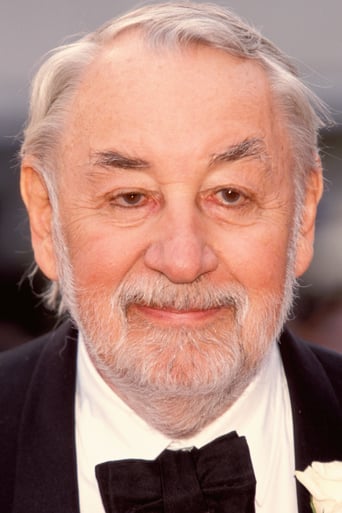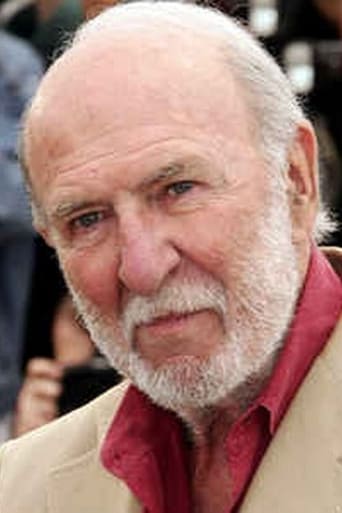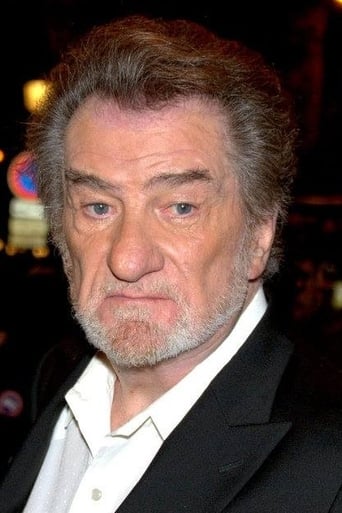Spoonatects
Am i the only one who thinks........Average?
Lidia Draper
Great example of an old-fashioned, pure-at-heart escapist event movie that doesn't pretend to be anything that it's not and has boat loads of fun being its own ludicrous self.
Erica Derrick
By the time the dramatic fireworks start popping off, each one feels earned.
Deanna
There are moments in this movie where the great movie it could've been peek out... They're fleeting, here, but they're worth savoring, and they happen often enough to make it worth your while.
popcorninhell
Lucien (Philippe Noiret) our thickset protagonist is a bit of a beguiling figure. On the surface he possesses all the traits of a villain or the very least a very unlikeable human-being. He's lazy and selfish; he carries on a lustful affair with a married and abused woman (Isabelle Huppert) and sees his position (a provincial sheriff) as an inconvenience not even bothering to arrest people who knowingly break serious laws. Furthermore he's utterly weak-willed; hen-pecked by his wife (Stephane Audran) and her peculiar brother (Eddy Mitchell) and harassed by his superiors in the provincial capital. What's worse a ballsy pimp who enjoys shooting cadavers in the local river decides humiliation is better than bribery as a means to getting what he wants. Something in Lucien finally snaps and he uses his only two advantages to rid the world of his problems; his intelligence and his remote location.Coup de Torchon (1981) takes place "at the edge of civilization" on the outskirts of a French African colony mere months before WWII. Barely accessible by train, Lucien's small colorful town is a cesspool of disease, decay and crime to which Alex turns from idle bystander to perverted exterminating angel. Yet it is the way he pulls off his various revenges that is at once beguiling and disturbing. Every situation is pre-calculated and seemingly natural. Lucien never loses his sincerity or blows his cover which makes everything he does absolutely shocking. One minute he's shooting a man in the stomach, the next he's genteel with his mistress.At one point Lucien remarks that he is the devil incarnate which while giving him a bit too much credit nevertheless plays into the themes of good and evil in the film. The story is bookended by a scene where Lucien is acting as a Prometheus-like figure to a group of African children; then by another where he aims his shotgun at one of the same children as a boy stares at him blankly. As morality and civilization crumbles throughout the film, the often felt but never seen rise of Nazism promises to obfuscate the sins of the reckless sheriff. Finally there's the character of the new school teacher (Irene Skobline) who exemplifies all that is good and innocent. At the end of the film when war is finally declared, Lucien dances with her as if she were the spoils of his hedonistic one man war.As despicable as his actions are however, Lucien remains a charming central figure. Like Shakespeare's Iago, his mischievousness is hidden by an innocuous face and harmless, good-natured wit. Unlike in Bad Lieutenant (1997) this cop doesn't let the audience sit on the sidelines and say "there but by the grace of God go I." Coup de Torchon seduces you into indulging in Lucien's Machiavellian plans and for an instant lets you have sympathy for the devil.http://www.theyservepopcorninhell.blogspot.com
ThurstonHunger
In general the Criterion Collection has been pretty reliable for me, and while I'm glad I came across this film, I see it as a somewhat ambitious failure. I have not read the Thompson novel from which it was drawn, but transplanting a story from the American South to crumbling colonial West Africa alone is inspired.If the film is a comedy, then it did not work me. The melding of slapstick with social commentary ran thin for me, but again it could just be that I lack le bone funny. At least I recognized parts here that likely were intended to be ribald (as opposed to some Japanese humor, where I'm often completely lost).Perhaps it is not that the humor is stupid (although the recurring dimwit incest interlude and the outhouse surprise...surely push it), but that the characters are stupid. That being said, the lead character it is of course crucial that you see him as a bozo of sorts, but behind his broad caricature of indolence, is there some intuition or even initiative stashed away? Again, an ambitious choice to have an apparent laggard as your lead character. He's seen as perpetually exhausted and at the same time amazingly lazy. An inept if not corrupt sheriff, but potentially very fair-minded. A slothful yet irresistible sex machine? That character alone was worth the watch for me, especially a couple of more serious discussions he has.But ultimately what does the film do? Take us from the joys of a meaningless existence to the tragedy of a meaningless existence. The directors sets up some of the early kills as somewhat justified, only to move through less and less "necessary" slaughter ending abruptly with the image of innocence being as wantonly wasted? And that image is meant to tie back visually to the films start, as if to imply this is just the way of the world. A cycle of violence.Does this excuse our pot-bellied peculiar policeman? Do his messianic delusions even make sense, as he plots to seduce the "pure" schoolteacher? And do the three women intentionally seem to similar, as if they are plots along the same curve and that curve is a circle.I don't know, and regrettably I did not care as much as I should have. Perhaps the clumsiness of the film that might pass as charm for other viewers? Perhaps the predictable randiness, that even a few decades ago felt like a use of sex as cheap titillation.Is it just a parable of despair? Is it just a jokey eulogy for the colonial ways, saying adieu to its greed, stupidity and savagery? I don't know, that's why it gets a 5/10 for me... I do know that it makes me want to read the Thompson novel to see what inspired Tavernier to take on this.See what you think, but if you think I'm too harsh on the stupidity of the film, I hope you get the DVD that offers the proposed alternate ending with two monkeys... Ugh...that would have got a 3/10.
Souscolline
Bertrand Tavernier has taken the novel "TOP 1280" by Jim Thompson set in North Carolina and produced a riveting French film noir set in Senegal in 1938. At that time it was a French colony that exhibited similar social and racial patterns as in the American South. The use of color and humor add a new dimension to the genre. Tavernier in his comments about the film on the DVD talks about the change in the light in the late afternoon in west Africa. It becomes less intense so he uses pastel colors. Note the light blue walls and the pink shirt of Philippe Noiret who is superb as the village policeman Cordier. Isabelle Huppert who plays the mistress of Cordier with intensity and humor and the other actors make this a must see film. There is much humor in the film but be aware that there are many violent scenes. This is French film noir at it's best.
Spleen
One of those films that's known, if at all, entirely because of its amusing title, is something listed on the IMDb as "Zeisters" but alternately titled "Fat Guy Goes Nutzoid". One suspects the alternate title is apt, too, because there's probably not a lot more to that film than a fat guy going nutzoid. "Clean Slate" could also be called, with about as little oversimplification, "Doormat Goes Nutzoid". The first part of the film sees Bertrand Tavernier, helped along by Pilippe Noiret's broad acting and more co-operation than was strictly necessary from the rest of the cast and crew, establish again and again and again that Lucien is a doormat. In a typical scene two people who are of little account themselves will take turns tripping him so that he sprawls in the dust, only to watch him get up and apologise for falling over. It's like watching George McFly from "Back to the Future".Then, in the latter and believe it or not better part of the film, Tavernier and Noiret slam on the brakes, skid 180 degrees and show us Lucien going nutzoid, killing off whoever gets or has gotten in his way, safe from suspicion because of his established persona. The film ends when it ends.I saw a 16mm print which did little for what I suspected was nice, crisp location photography, but it was clear enough Tavernier was trying (with success) to make the remote and somewhat neglected African village look like a bare stage; which, along with the hints of pervasive colonial corruption, was necessary to allow such a piece of conceptual art as "Doormat Goes Nutzoid" to come to life. Necessary, but not sufficient.





